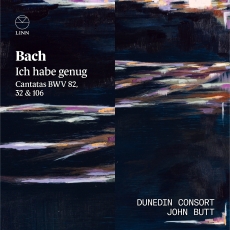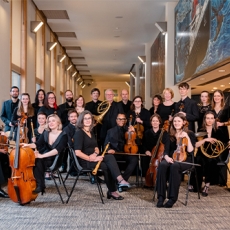Dunedin Consort - Bach: Ich habe genug - MusicWeb International
It’s not so much that the Dunedin Consort and John Butt take us where no-one has gone before – though their recording of Copland’s In the Beginning and other works broke new ground for them – as that they take us over familiar territory and map it more clearly than most have done before. All their Bach recordings for Linn Records to date have cast new light on the highlands of his music, from the Brandenburg Concertos to the two Passion settings and the b-minor Mass. If the Magnificat and Christmas cantatas and the present release seem like comparative lowlands, you won’t think so after hearing these Linn recordings.
The opening Cantata No.82, which commemorates the words of the aged Simeon when Jesus was presented in the temple, was composed for Candlemas, the feast which commemorates that presentation on February 2nd. Luke tells us that, having waited all his life for the event, Simeon spoke the words which became the evening canticle Nunc Dimittis, “Now lettest thou thy servant depart in peace”, so the text of this cantata is an elaboration of that farewell theme: Simeon – and the Christian soul – have achieved enough in discovering Jesus. The tone is at once valedictory and consoling, set with some of Bach’s most beautiful, almost other-worldly music. There are some formidable competitors in this cantata. Those older recordings set a very high benchmark, but the new Linn recording is up there alongside them.
If Cantata No.32 doesn’t quite match the profound beauty of No.82, I would still have happily endured sitting through the 4-hour Hauptgottesdienst on a cold winter first Sunday after Epiphany in 1726 to hear a performance as appealing as this. Like the more famous Wachet auf, Cantata No.140, it’s a dialogue between the soul and Jesus, which Joanne Lunn and Matthew Brook bring off to a t. I’m more than happy to forego authenticity for this beautifully moving Linn performance.
The funeral cantata, No.106, seems to have been composed much earlier than the other works here, probably when Bach was still at Mühlhausen, aged about 23, but it’s far from an immature work. It has been speculated that the funeral was for Bach’s uncle; if so, it may help to explain the depth of sincerity with which Bach sets words which are far removed from the modern attitude to death, yet speak to us through the music. How Bach could achieve such musical maturity so soon would be known only to him – and perhaps even not to him – and God. Similarly, I can’t begin to tell you how the likes of the Dunedin Consort bring us such a wonderful recording as this of Cantata 106, only that they do. Trained as I am to use words and to teach others to use them, they fail on such occasions. Perhaps recording in the middle of the Covid pandemic brought the Consort closer to Bach’s world view; I know many seem to have rediscovered a sense of the spiritual, and this account of all these cantatas, not least No.106, is intensely spiritual.
Forgetting about the complexities of coupling, however, the new Linn recording would be among my top two or three recommendations for each of the three cantatas which it contains.


